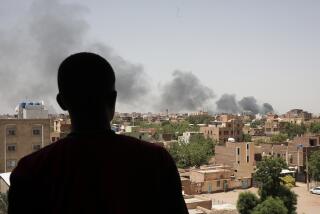Somalis Rally, Declaring Victory for Ex-Fugitive Aidid : Africa: Event also launches warlord’s new book presenting his vision for the nation’s future.
- Share via
MOGADISHU, Somalia — With 7,400 American troops bunkered in heavily fortified Mogadishu compounds and 8,600 more biding their time on U.S. warships off the coast, nearly 2,000 Somali men, women and children poured into the streets of the capital Sunday to hoist flowers and palm branches, chant praises to Allah and, mostly, declare victory for their leader--onetime fugitive-turned-powerbroker Mohammed Farah Aidid.
The demonstration was a combination victory rally and launching for Aidid’s new book--a glossy work on the Somali general’s vision for the future of Somalia, authored during his five months on the run from an unsuccessful U.N. manhunt. The U.S.-led hunt officially ended last week when the U.N. Security Council lifted an arrest warrant implicating Aidid in the killings of dozens of U.N. peacekeepers during his guerrilla war against U.S. and U.N. forces.
The United Nations and the Clinton Administration are now urgently encouraging Aidid and his dozens of rivals to find their own way to peace before U.S. and other troops withdraw from this still well-armed and deeply divided nation.
The deadline for that reconciliation, according to most military and civilian officials here, is approaching much faster than the March 31 pullout date President Clinton has set for U.S. forces. It is, in fact, just one week away, when a U.N.-sponsored conference on Somalia takes place next Monday in the Ethiopian capital of Addis Ababa.
Calling the conference “the Somalis’ last chance to address their future,” Staffan DeMistura, the United Nations Children’s Fund (UNICEF) representative in Somalia, said, “If it doesn’t work, (Somalia) may well end up another Afghanistan--and that is an abandoned country.”
Unless the many Somali factions--including Aidid’s--pull together during the conference, which will include representatives of nations that have been footing the multibillion-dollar bill to try to save Somalia, a tired world will simply shift its aid to nations more willing to help themselves, DeMistura and other U.N. officials said.
“This is, or could be, the best chance or the last chance for the Somalis to tell the international community what it can do for them to empower them,” the UNICEF representative concluded during a news conference called last week in Nairobi to reinforce the urgency of the session in Ethiopia.
But at Sunday’s rally, speakers from Aidid’s Somali National Alliance made it clear their leader still has no intention of cooperating with the U.N. peacemaking mission.
Aidid has said he plans to attend the Addis Ababa conference, but he has indicated that his role could well be that of a spoiler.
When he emerged from hiding last week, Aidid called on all foreign troops to leave Somalia, underscoring his recent threat to launch new attacks on U.S. forces if they attempt to leave their compounds and patrol roads that his faction controls in Mogadishu.
At the same time, Aidid, whose subclan is among Somalia’s best-armed and fiercest militia groups, appealed to the international community to continue sending Somalia financial assistance and humanitarian aid--but he stressed that only Somalis should decide how to use it.
So far, there has been no official contact between Aidid and retired U.S. Adm. Jonathan Howe, U.N. Secretary General Boutros Boutros-Ghali’s personal envoy in Somalia. Howe issued the original order to arrest Aidid--and placed a $25,000 bounty on his capture--after the June killing of 24 Pakistani soldiers.
And there was little talk of reconciliation by Aidid during his meeting last week with U.S. special envoy Robert B. Oakley, who is trying to forge a semblance of Somali unity in advance of the U.S. troop pullout.
The principal issue on Aidid’s agenda is the release of 23 remaining detainees in a makeshift U.N. prison facility and three other top leaders held in an undisclosed location, all captured by U.S. Army Rangers during their hunt for Aidid and other militia suspects. Nine low-level members of Aidid’s faction were freed Saturday.
The prisoner release has stirred intense debate in Washington and at U.N. headquarters in New York over the legality and human rights implications of holding U.N. detainees without formal charges. Aidid had urged the detainees’ release last month when he freed a U.S. Army helicopter pilot captured after a fierce battle that left 18 Americans and 300 Somalis dead.
More to Read
Sign up for Essential California
The most important California stories and recommendations in your inbox every morning.
You may occasionally receive promotional content from the Los Angeles Times.













